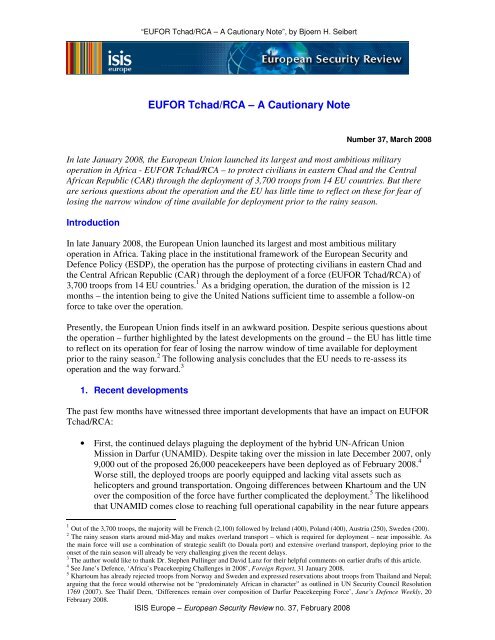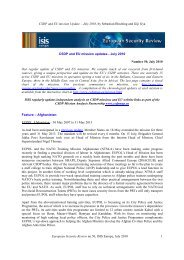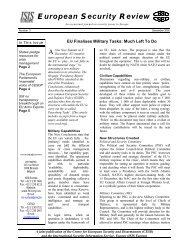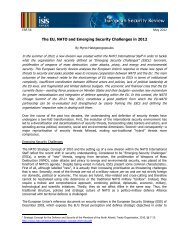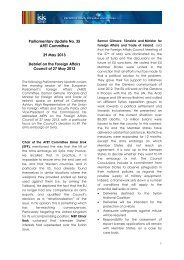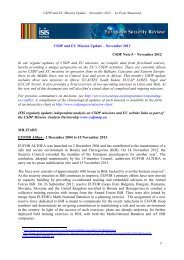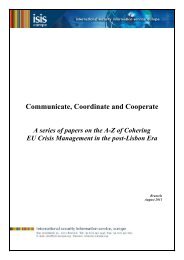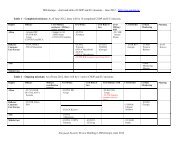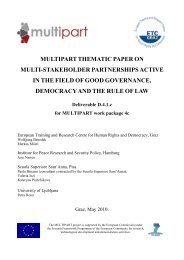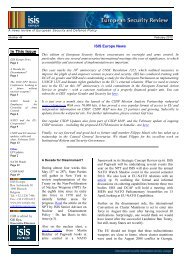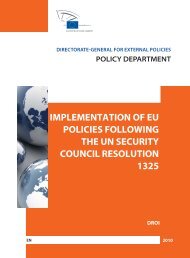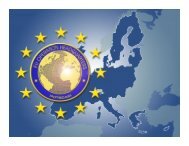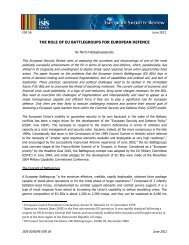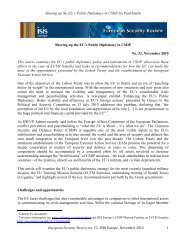EUFOR Tchad/RCA â A Cautionary Note - ISIS Europe
EUFOR Tchad/RCA â A Cautionary Note - ISIS Europe
EUFOR Tchad/RCA â A Cautionary Note - ISIS Europe
Create successful ePaper yourself
Turn your PDF publications into a flip-book with our unique Google optimized e-Paper software.
“<strong>EUFOR</strong> <strong>Tchad</strong>/<strong>RCA</strong> – A <strong>Cautionary</strong> <strong>Note</strong>”, by Bjoern H. Seibert<br />
<strong>EUFOR</strong> <strong>Tchad</strong>/<strong>RCA</strong> – A <strong>Cautionary</strong> <strong>Note</strong><br />
Number 37, March 2008<br />
In late January 2008, the <strong>Europe</strong>an Union launched its largest and most ambitious military<br />
operation in Africa - <strong>EUFOR</strong> <strong>Tchad</strong>/<strong>RCA</strong> – to protect civilians in eastern Chad and the Central<br />
African Republic (CAR) through the deployment of 3,700 troops from 14 EU countries. But there<br />
are serious questions about the operation and the EU has little time to reflect on these for fear of<br />
losing the narrow window of time available for deployment prior to the rainy season.<br />
Introduction<br />
In late January 2008, the <strong>Europe</strong>an Union launched its largest and most ambitious military<br />
operation in Africa. Taking place in the institutional framework of the <strong>Europe</strong>an Security and<br />
Defence Policy (ESDP), the operation has the purpose of protecting civilians in eastern Chad and<br />
the Central African Republic (CAR) through the deployment of a force (<strong>EUFOR</strong> <strong>Tchad</strong>/<strong>RCA</strong>) of<br />
3,700 troops from 14 EU countries. 1 As a bridging operation, the duration of the mission is 12<br />
months – the intention being to give the United Nations sufficient time to assemble a follow-on<br />
force to take over the operation.<br />
Presently, the <strong>Europe</strong>an Union finds itself in an awkward position. Despite serious questions about<br />
the operation – further highlighted by the latest developments on the ground – the EU has little time<br />
to reflect on its operation for fear of losing the narrow window of time available for deployment<br />
prior to the rainy season. 2 The following analysis concludes that the EU needs to re-assess its<br />
operation and the way forward. 3<br />
1. Recent developments<br />
The past few months have witnessed three important developments that have an impact on <strong>EUFOR</strong><br />
<strong>Tchad</strong>/<strong>RCA</strong>:<br />
• First, the continued delays plaguing the deployment of the hybrid UN-African Union<br />
Mission in Darfur (UNAMID). Despite taking over the mission in late December 2007, only<br />
9,000 out of the proposed 26,000 peacekeepers have been deployed as of February 2008. 4<br />
Worse still, the deployed troops are poorly equipped and lacking vital assets such as<br />
helicopters and ground transportation. Ongoing differences between Khartoum and the UN<br />
over the composition of the force have further complicated the deployment. 5 The likelihood<br />
that UNAMID comes close to reaching full operational capability in the near future appears<br />
1 Out of the 3,700 troops, the majority will be French (2,100) followed by Ireland (400), Poland (400), Austria (250), Sweden (200).<br />
2 The rainy season starts around mid-May and makes overland transport – which is required for deployment – near impossible. As<br />
the main force will use a combination of strategic sealift (to Douala port) and extensive overland transport, deploying prior to the<br />
onset of the rain season will already be very challenging given the recent delays.<br />
3 The author would like to thank Dr. Stephen Pullinger and David Lanz for their helpful comments on earlier drafts of this article.<br />
4 See Jane’s Defence, ‘Africa’s Peacekeeping Challenges in 2008’, Foreign Report, 31 January 2008.<br />
5 Khartoum has already rejected troops from Norway and Sweden and expressed reservations about troops from Thailand and Nepal;<br />
arguing that the force would otherwise not be “predominately African in character” as outlined in UN Security Council Resolution<br />
1769 (2007). See Thalif Deen, ‘Differences remain over composition of Darfur Peacekeeping Force’, Jane’s Defence Weekly, 20<br />
February 2008.<br />
<strong>ISIS</strong> <strong>Europe</strong> – <strong>Europe</strong>an Security Review no. 37, February 2008
“<strong>EUFOR</strong> <strong>Tchad</strong>/<strong>RCA</strong> – A <strong>Cautionary</strong> <strong>Note</strong>”, by Bjoern H. Seibert<br />
increasingly remote. As <strong>EUFOR</strong> is meant to complement UNAMID; this prospect should<br />
raise serious concerns in regards to <strong>EUFOR</strong>.<br />
• Second, the escalation of Chad’s internal power struggle. A peace agreement brokered by<br />
Libya in October 2007 (known as the Sirte Agreement) proved short-lived, with clashes<br />
between several rebel groups and the Chadian Armed Forces (ANT) resuming within<br />
weeks. After heavy fighting in eastern Chad, three rebel groups (RFC, UFDD and<br />
UFDD/F) 6 formed an alliance against President Déby, and in late January/early February<br />
2008 they launched a lightning assault on Chad’s capital N’djamena. While this attempt to<br />
overthrow Déby failed, the rebels did manage to withdraw from the capital in an orderly<br />
manner, thereby ensuring that the power struggle within the country will continue.<br />
• Third, the deteriorating relationship between Chad and Sudan; fueled over the last few<br />
months by the support of each country for the rebellion in the other. While President Déby,<br />
in December 2007, ordered air strikes on Chadian rebels inside Darfur, Khartoum assisted<br />
the formation of the aforementioned rebel alliance and facilitated the assault on N’djamena.<br />
In response, Déby has promised retaliation against Sudan. At the same time, as some of the<br />
Darfurian rebels had rushed to Déby’s support in N’djamena, Khartoum stepped up its<br />
counter-insurgency campaign in western Darfur. The consequent increase in fighting in<br />
Darfur also caused further population displacement, with several thousand additional<br />
Darfurians seeking refuge in eastern Chad.<br />
These developments were not unanticipated. A leaked situational assessment from the Austrian<br />
Armed Forces from November 2007, discusses at some length the possibility of a renewed rebel<br />
assault on N'djamena as well as further destabilization of Darfur as a result of the non-deployment<br />
of UNAMID. 7 It is unclear, however, whether the impacts of these developments were fully<br />
understood at the time.<br />
2. Conceptual flaws<br />
At present <strong>EUFOR</strong>’s mission appears to suffer from conceptual flaws, as its objective became<br />
increasingly detached from the broader context. The following section will briefly outline how the<br />
broader regional conflict gradually receded into the background.<br />
Over the past several years, the situation in Darfur (the western region of Sudan) - and not in Chad<br />
and CAR - has been a serious concern for <strong>Europe</strong>an policy-makers. The deaths of thousands of<br />
Darfurians and the displacement of millions more created political pressures in <strong>Europe</strong> to resolve<br />
the humanitarian crisis. As a direct intervention in Darfur proved difficult, however – largely due to<br />
Khartoum’s objections, the alternative was to act on the margins of the crisis. 8 Eastern Chad and<br />
northeastern CAR, where thousands of Darfurians had sought refuge, thus became the alternative<br />
focus.<br />
6 Rally of Forces for Change (Rassemblement des forces pour le changement: RFC) led by Timane Erdimi; Union of Forces for<br />
Democracy and Development (Union des forces pour la démocratie et le développement: UFDD) led by Mahamat Nouri; Union of<br />
Forces for Democracy and Development-Fundamental (Union des forces pour le développement et la démocratie /Fondamentale:<br />
UFDD/F) led by Abdel Wahid Aboud Mackaye.<br />
7 Bundesministerium der Landesverteidigung, Militärstrategische Weisung Nr.2 (GZ S93304/134-Evb/2007). Concerning the<br />
possibility of renewed rebel attack, the assessment reads: "Unter dem Gesichtspunkt, dass sich die noch aktiven Rebellengruppen<br />
den Sturz von Präsident DEBY zum Ziel gesetzt haben, ist mit der Möglichkeit eines Wiederaufflammens der bewaffneten<br />
Auseinandersetzungen zu rechnen. Dabei ist nicht auszuschließen, dass die Rebellen – wie bereits im April 2006 – auch die<br />
Hauptstadt NDJAMENA angreifen. Die Vorwarnzeit für einen derartigen Angriff würde dabei voraussichtlich einige wenige Tage<br />
betragen. Ob in einem derartigen Anlassfall auch dieses Mal die französischen Streitkräfte auf der Seite der Regierungstruppen in<br />
die Kämpfe eingreifen würden, kann derzeit nicht beurteilt werden."<br />
8 See Damien Helly, ‘Crisis in Chad: Implications for the EU’, EUISS Analysis, 5 February 2008, p.1.<br />
<strong>ISIS</strong> <strong>Europe</strong> – <strong>Europe</strong>an Security Review no. 37, February 2008
“<strong>EUFOR</strong> <strong>Tchad</strong>/<strong>RCA</strong> – A <strong>Cautionary</strong> <strong>Note</strong>”, by Bjoern H. Seibert<br />
From the initially intended purpose of resolving the Darfur crisis, the <strong>Europe</strong>an mission’s objective<br />
hence became the prevention of the crisis from spilling over into the wider region. Yet again, this<br />
proved unattainable, however, when President Déby - despite French pressure - only agreed to the<br />
<strong>Europe</strong>an force on the condition that it would not deploy on the border between Chad and Sudan. 9<br />
As the regional dimension of the crisis could not be effectively addressed, the mission’s objective<br />
was further narrowed to the protection of civilians in danger, particularly refugees and internally<br />
displaced persons (IDPs) inside eastern Chad and northeastern CAR. However, when the objective<br />
was narrowed there appears to have been little appreciation of the linkage between the<br />
humanitarian crisis in eastern Chad and the power struggle within Chad. 10 Thus, it appears that the<br />
possible implications for Chadian politics of deploying a <strong>Europe</strong>an force were not well understood.<br />
Today, the EU finds itself in the awkward position of being drawn into the intra-Chadian power<br />
struggle – while refusing to admit it – and at the same time, unable to address the Darfurian crisis<br />
or its regional implications.<br />
3. Short-term problems<br />
In addition, and linked, to these problems at the conceptual level, <strong>EUFOR</strong> is also likely to face<br />
implementation problems. In fact, recent developments have further highlighted some already<br />
existing challenges for the operation. According to the operational commander of <strong>EUFOR</strong>,<br />
Lieutenant General Patrick Nash, the current key objective of <strong>EUFOR</strong> is to establish a “safe and<br />
secure environment” in the area of operation. Achieving this objective is likely to prove difficult,<br />
however, for a combination of reasons: 11<br />
• The vastness of the area of operation – 350,000 km² (an area as large as Germany),<br />
combined with the difficult terrain and severe climate conditions, form a great challenge for<br />
military operations. 12<br />
• The relatively small size of <strong>EUFOR</strong>, which in essence comprises three battalions and a<br />
quick reaction force, coupled with a short supply of helicopters – which act as a force<br />
multiplier.<br />
• The increased insecurity in eastern Chad and north-eastern CAR as a result of the latest<br />
rebel attack on N’djamena and the deteriorating security situation in Darfur.<br />
Achieving the requisite security presence in the area of operation, which is necessary to prevent<br />
attacks on civilians, aid-workers or UN personnel, will thus be very difficult. On the other hand, it<br />
would be a mistake to conclude that <strong>EUFOR</strong> will have no impact on the security situation in<br />
eastern Chad and north-eastern CAR. Indeed, it is very likely that <strong>EUFOR</strong> will be able to improve<br />
security in parts of the area of operation – especially in the Dar Sila department in the Ouaddaï<br />
region where a robust <strong>EUFOR</strong> presence was announced. 13<br />
9 Not having the <strong>Europe</strong>an force deployed directly on the border enables President Déby to continue to freely intervene in Darfur.<br />
10 Damien Helly, op. cit.<br />
11 For a more detailed analysis see: Bjoern H. Seibert, ‘African Adventure? Assessing the <strong>Europe</strong>an Union's Military Intervention in<br />
Chad and Central African Republic’, Working Paper, Security Studies Program, Massachusetts Institute of Technology (MIT),<br />
November 2007, pp. 30-35, available at:<br />
http://web.mit.edu/ssp/Publications/working_papers/WP_07-1.pdf<br />
12 According to Lt. Gen. Nash, the area of operation comprises the following regions: Wadi Fira, Ouaddaï, Salamat in Chad and<br />
Vakaga and Haute-Kotto (above latitude 8°) in CAR.<br />
13 This is where Lt. Gen. Nash has announced a robust security presence of <strong>EUFOR</strong>. See <strong>Europe</strong>an Union, ‘Summary of Remarks by<br />
Lt General Patrick Nash: Operation Commander <strong>EUFOR</strong> <strong>Tchad</strong>/<strong>RCA</strong>’, Press Conference, Brussels, January, 29 2008.<br />
<strong>ISIS</strong> <strong>Europe</strong> – <strong>Europe</strong>an Security Review no. 37, February 2008
“<strong>EUFOR</strong> <strong>Tchad</strong>/<strong>RCA</strong> – A <strong>Cautionary</strong> <strong>Note</strong>”, by Bjoern H. Seibert<br />
But even this may cause problems. If <strong>EUFOR</strong>’s presence establishes zones of greater security, its<br />
absence will, by definition, create areas that are less secure. Such security imbalances on the<br />
ground are very likely to trigger further displacement from the less to the more secure areas. 14<br />
Given the high volatility of the region – and the increased insecurity in Darfur – cross-border<br />
population movements are possible, if not likely. Such an outcome would not only be undesirable<br />
in its own right, but also create additional challenges for <strong>EUFOR</strong> and aid-delivery.<br />
Further population displacement is not the only possible adverse side-effect of <strong>EUFOR</strong>’s presence,<br />
however. Once deployed, <strong>EUFOR</strong> will also lift the burden from the Chadian Armed Forces, which<br />
have thus far been responsible for the protection of the refugees and IDPs. This will enable<br />
President Déby to use his forces instead to step up his campaign against the rebels and possibly also<br />
to retaliate against Sudan. Despite the oft-repeated claim that <strong>EUFOR</strong> is neutral, the reality,<br />
therefore, is that <strong>EUFOR</strong> does not – and will not – have a neutral impact on the conflict. 15 Aside<br />
apparently from the EU, no other party to the conflict is under any illusion about these effects. 16<br />
4. Medium-term problems<br />
The potential problems associated with the mission do not end there. Over the medium term, two<br />
problems loom especially large.<br />
First, the EU appears to lack a coherent political strategy to deal with the power struggle inside<br />
Chad. This problem is a direct result of the aforementioned unwillingness to admit that <strong>EUFOR</strong>’s<br />
deployment will have an impact on the intra-Chadian conflict. Having effectively entered the<br />
conflict on behalf of President Déby, the EU has also weakened its position as arbitrator for a<br />
political compromise in Chad. Additionally, the conflict parties currently appear unwilling to agree<br />
to a political compromise, especially in the aftermath of the assault on N’djamena, as all sides feel<br />
that they have more to gain than to lose from the continuation of hostilities. Thus, the intra-Chadian<br />
power struggle will very likely continue, thereby ensuring that the humanitarian crisis in eastern<br />
Chad and northeastern CAR will also continue.<br />
Second, the likelihood that <strong>EUFOR</strong> will be able to hand over its mission to a credible follow-on<br />
force is questionable. <strong>EUFOR</strong> is meant to be a 12-month bridging operation, initially intended to<br />
allow the UN sufficient time to assemble a follow-on force. However, even before the recent<br />
developments, the probability that a sufficiently sized follow-on force would be able to take over<br />
the mission from <strong>EUFOR</strong> within one year was slim. There are now four main reasons for doubt:<br />
• First, the EU took several months to assemble its force, despite the limited timeframe of the<br />
operation and its members being among the wealthiest and militarily most capable countries<br />
in the world.<br />
14 The African Union Mission in Sudan (AMIS) had a similar experience, as pointed out in Bjoern H. Seibert, ‘African Adventure?<br />
Assessing the <strong>Europe</strong>an Union's Military Intervention in Chad and Central African Republic’, Working Paper, Security Studies<br />
Program, Massachusetts Institute of Technology (MIT), November 2007, p.32.<br />
15 This is of course aside from the oft-mentioned fact that France, which played a crucial role in securing Déby regime in the past, is<br />
the largest troop contributor of <strong>EUFOR</strong>.<br />
16 President Déby made this point clear in a recent interview with France's <strong>Europe</strong> 1 Radio: "Cela nous aurait aidé si l’Eufor était<br />
déjà installée, parce que j’aurai eu la possibilité de démonter les unités qui sont à la frontière et qui jouent ce rôle. Je lance un appel<br />
solennel à l’Union Européenne, à l’initiatrice de cette opération, la France, de faire en sorte que cette force vienne s’installer le plus<br />
rapidement possible afin de nous alléger du poids que nous supportons, nous, aujourd’hui, à savoir être garant de la sécurité de<br />
300.000 réfugiés soudanais, 170.000 <strong>Tchad</strong>iens déplacés. C’est un poids important et cela occupe beaucoup de nos forces." See<br />
transcript of the interview, available at<br />
http://www.presidencedutchad.org/Activites/Interviews/Interview%20du%20PR%20<strong>Europe</strong>%201.htm<br />
<strong>ISIS</strong> <strong>Europe</strong> – <strong>Europe</strong>an Security Review no. 37, February 2008
“<strong>EUFOR</strong> <strong>Tchad</strong>/<strong>RCA</strong> – A <strong>Cautionary</strong> <strong>Note</strong>”, by Bjoern H. Seibert<br />
• Second, peacekeeping operations in Africa are currently already short of 20,000 troops<br />
(65,000 are deployed instead of the 85,000 pledged). 17 The majority of the current shortfalls<br />
apply to UNAMID.<br />
• Third, recent developments have also underscored the fact that the area of operation is<br />
among the most unstable in Africa. Hence, the number of countries willing to volunteer<br />
forces for this dangerous, expensive and potentially open-ended mission is likely to be very<br />
small.<br />
• Fourth, to date, President Déby has rejected the idea of deploying an international follow-on<br />
force to eastern Chad.<br />
As a result, once the initial twelve months has expired, the EU is likely to find itself confronted<br />
with an ongoing conflict and the absence of a credible follow-on force to take over the mission. The<br />
EU would thus be faced with difficult choices: either stay, or leave in the absence of such a<br />
replacement force. As things stand today, it appears more likely that the EU will choose to leave.<br />
Aside from France, 18 few other participating countries seem willing to contemplate extending their<br />
stay on the ground. 19 Therefore, even if the <strong>EUFOR</strong> mission achieves its self-defined goal of<br />
enabling “the beginning of the return of IDPs”, this success would almost certainly evaporate once<br />
<strong>EUFOR</strong> withdraws and, more importantly, leaves the conflict unresolved.<br />
Concluding remarks<br />
The problems described above raise serious questions about the <strong>Europe</strong>an operation in Chad and<br />
CAR, which need to be addressed. Of particular concern are the possible adverse side-effects of<br />
<strong>EUFOR</strong>’s presence, which could potentially create more harm in an already troubled region.<br />
The EU, therefore, seriously needs to reflect on its mission and the implications of its involvement<br />
in the region. This mission is too important to be allowed to fail, and serious consideration is<br />
needed to address its underlying problems. As <strong>EUFOR</strong> will likely only reach full operational<br />
capacity during the rainy season, when traditionally armed conflict decreases, the EU will have a<br />
window of opportunity to reassess and plan ahead accordingly.<br />
Bjoern H. Seibert is a Master of Arts in Law and Diplomacy candidate at the Fletcher School of<br />
Law and Diplomacy bjoern.seibert@gmail.com<br />
17 Jane’s Defence, ‘Africa’s Peacekeeping Challenges in 2008’, Foreign Report, 31 January 2008; Africa Research Bulletin:<br />
Political, Social and Cultural Series, ‘African Peacekeeping’, Vol. 44 Issue 12 (January 2008): 17361A.<br />
18 One alternative would be that France would take over the mission completely after 12 months. However, it is unclear if France<br />
would be willing to shoulder the burden of the entire mission for an extended period of time, especially as France appeared to be<br />
planning to reduce its presence in Africa.<br />
19 Sweden, one of the largest force contributors, has, for example, announced that its force would only deploy for a period of four<br />
months. See Sveriges Radio International, ‘No Extension of Swedish Chad-Mission’, February 21, 2008. Sweden’s decision might<br />
affect the willingness of the other participating states to stay for the entire 12 months.<br />
<strong>ISIS</strong> <strong>Europe</strong> – <strong>Europe</strong>an Security Review no. 37, February 2008


